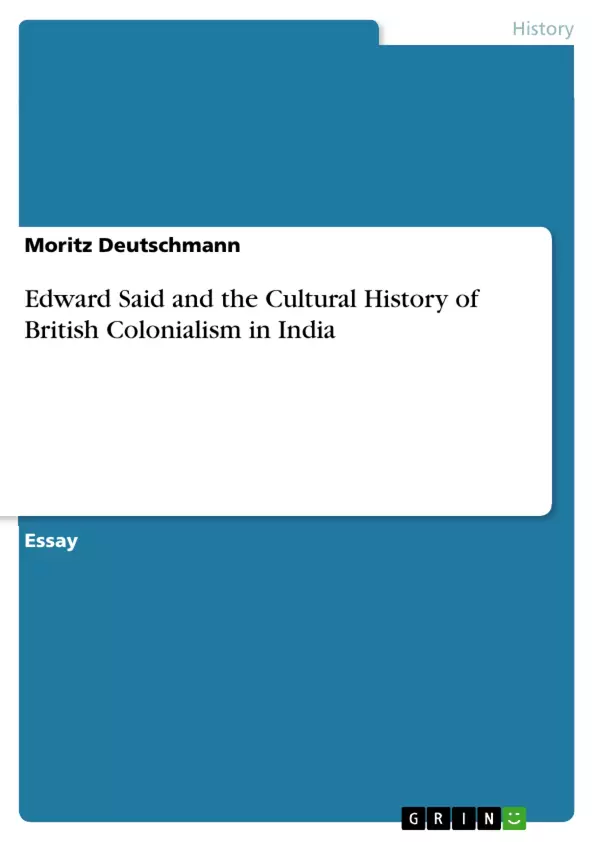This text discusses the role of culture in the history of European colonialism. It takes Said's notion of "Orientalism" as a starting point. It then discusses two very different books that have tried to make Said's notion useful for the study of concrete colonial situations: Christopher Bayly's "Empire and Information", and Nicholas Dirks' "Castes of Mind". Whereas Bayly's concept of an "information order" tries to undermine ideas about a European hegemony of knowledge, Dirks stresses the far-reaching influence European concepts had even on post-colonial notions of caste in India.
Inhaltsverzeichnis (Table of Contents)
- Said and "Orientalism"
- Nicholas Dirks' Genealogy of Caste
- Christopher Bayly: Knowledge and Indigenous Agency
Zielsetzung und Themenschwerpunkte (Objectives and Key Themes)
This essay reconstructs Edward Said's main ideas about Orientalism and analyzes the cultural history of British colonialism in India through the lens of Said's theories. The essay examines the influence of Said's work on contemporary research, particularly the books by Christopher Bayly and Nicholas Dirks, both of which offer insights into the role of knowledge and culture in imperial rule.
- The concept of Orientalism as a tool of European domination
- The cultural impact of colonialism on both colonized societies and European culture
- The role of knowledge and "cultural technologies of rule" in colonialism
- The emergence of caste as a key ethnographic category in colonial India
- The agency of indigenous populations in shaping the cultural landscape of colonialism
Zusammenfassung der Kapitel (Chapter Summaries)
- Said and "Orientalism": This section introduces Edward Said's influential work, "Orientalism," and defines the concept as a Western style of dominating and restructuring the Orient. The chapter explores Said's arguments about the recurring elements in European perspectives on the Orient, highlighting the inherent monologue and constructivist nature of Orientalism. The section also discusses Said's focus on the role of culture in imperialism, particularly its ability to extend the reach of imperial power beyond direct economic and military control.
- Nicholas Dirks' Genealogy of Caste: This chapter examines the work of Nicholas Dirks, a scholar who explores the "cultural technologies of rule" employed by British colonial administrators in India. Dirks focuses on the concept of caste, arguing that it was during the colonial period that caste became a dominant and systematizing element in Indian society. The chapter discusses how the colonial state leveraged caste as a tool for governance, particularly in the aftermath of the 1857 uprising. It also explores the role of caste in Indian resistance to colonialism and in post-colonial India.
- Christopher Bayly: Knowledge and Indigenous Agency: This chapter introduces a different school of colonial history that challenges Said's assumptions about the dominant role of European culture in imperialism. These historians, often associated with the "Cambridge school," highlight the agency of indigenous populations in shaping the cultural landscape of colonialism. The chapter suggests that culture was a field where indigenous actors could subvert and negotiate the dominant structures of colonial power.
Schlüsselwörter (Keywords)
The central themes of the essay are Orientalism, colonialism, culture, knowledge, power, and the cultural history of British colonialism in India. Key concepts include the "cultural technologies of rule," the genealogy of caste, indigenous agency, and the role of knowledge in shaping colonial governance. The essay also explores the impact of Said's theories on the historiography of British imperialism in India.
Frequently Asked Questions
What is Edward Said's definition of "Orientalism"?
Said defines Orientalism as a Western style for dominating, restructuring, and having authority over the Orient through cultural construction.
How did colonialism impact the concept of "caste" in India?
Nicholas Dirks argues that caste became a dominant, systematizing element of Indian society primarily through British "cultural technologies of rule."
What is Christopher Bayly's perspective on colonial knowledge?
Bayly emphasizes indigenous agency, suggesting that the "information order" was not solely a European hegemony but a field of negotiation with local actors.
Why is culture considered a "technology of rule"?
Because it allowed imperial powers to extend control beyond military force by shaping knowledge, categories, and identities of the colonized.
What was the role of the 1857 uprising in colonial governance?
After the uprising, the colonial state increasingly leveraged ethnographic categories like caste to better categorize and control the Indian population.
- Quote paper
- Moritz Deutschmann (Author), 2009, Edward Said and the Cultural History of British Colonialism in India, Munich, GRIN Verlag, https://www.grin.com/document/163884



